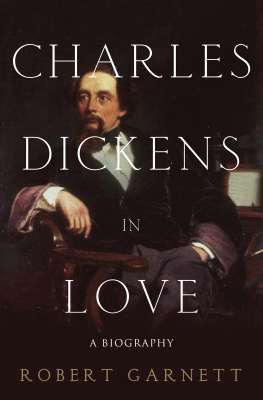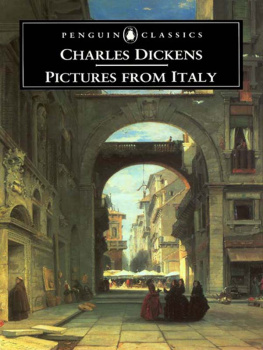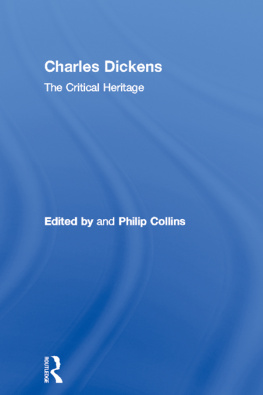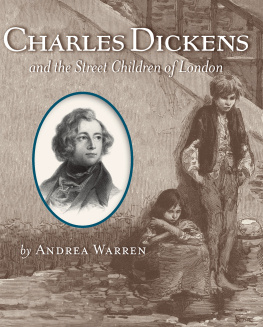CHARLES
DICKENS
IN
LOVE
Robert Garnett

PEGASUS BOOKS
NEW YORK LONDON
For Margery
1950-1975
CHAPTER 1
No discourse, except it be of love
C harles Dickens first visited America in 1842. Not yet thirty when he landed in Boston, he was already famous for half a dozen novels, including the rambling Pickwick Papers, the melodrama Oliver Twist, and The Old Curiosity Shop, in which the death of the girl heroine Little Nell had been a maudlin sensation in both Britain and America. Now America was eager to welcome him, and he in turn arrived with high expectations
only to be disappointed. Americans were coarse, cocky, and money-loving; obtrusive, vain, and ignorant. He reported one of them boasting, Our people dont think of poetry, sir. Dollars, banks, and cotton are our booksand Dickens agreed: They certainly are in one sense; for a lower average of general information than exists in this country on all other topics it would be very hard to find. American men chewed tobacco and spit everywhere, incessantly. In four months of touring, from Boston to St. Louis, he found little to admire, much to dislike.
Toward the end of his tour, however, he visited Niagara Falls, and, awed by natures greatest altar, he momentarily put aside the annoying Americans. He was seldom sensitive to the presence of the divine, in or out of church, but standing at the foot of the cataract he was moved by powerful intimations of the sacred. It would be hard for a man to stand nearer God than he does there, he wrote to his close friend John Forster in England:
There was a bright rainbow at my feet; and from that I looked up togreat Heaven! to what a fall of bright green water! The broad, deep, mighty stream seems to die in the act of falling; and, from its unfathomable grave arises that tremendous ghost of spray and mist which is never laid, and has been haunting this place with the same dread solemnityperhaps from the creation of the world.
In this sublime mood, and with the mighty falls suggesting both Death and Resurrection, his thoughts irresistibly turned to a beloved girl, Mary Hogarth.
His wifes younger sister, Mary Hogarth had died suddenly five years earlier, only seventeen, and since that stunning loss Dickens had revered her as his tutelary angel. In moments of deepest feeling, he sensed the presence and influence of that spirit which directs my life, and through a heavy sorrow has pointed upwards with unchanging finger for more than four years past.
Now at Niagara Falls, Mary was vividly present, hovering in that tremendous ghost of spray and mist which haunted the falls with such dread solemnity. When I felt how near to my Creator I was standing, he wrote in American Notes, the travel book he wrote about his visit, the first effect, and the enduring oneinstant and lastingof the tremendous spectacle was Peace. Peace of Mind, tranquillity, calm recollections of the Dead. The rest of America was well forgotten, but at Niagara he stood on Enchanted Ground, where the spirit of his beloved Mary was alive and spoke to him:
What voices spoke from out the thundering water; what faces, faded from the earth, looked out upon me from its gleaming depths; what Heavenly promise glistened in those angels tears, the drops of many hues that showered around, and twined themselves about the gorgeous arches which the changing rainbows made!
Marys grave was in Kensal Green Cemetery outside London, and from Niagara he wrote to his friend John Forster: What would I give if the dear girl whose ashes lie in Kensal-green, had lived to come so far along with usbut she has been here many times, I doubt not, since her sweet face faded from my earthly sight.
Dickens survived Mary Hogarth by more than thirty years, and until he died his love for her was inseparable from his strongest religious feelings: indeed, she was his religion. Hers was the human face of perfect beatitude, and of his own ultimate longings: peace of mindtranquillitygreat thoughts of eternal rest and happiness.
A quarter century later, he crossed the Atlantic again, this time to give a series of public readings from his works. During his reading tour, he took time out to make a second visit to Niagara Fallsthe only spot he had visited in 1842 that he went out of his way to revisit in 1868. It was March; the upstate New York winter had been, as always, frigid and snowy; but as he traveled toward Niagara from Boston, giving readings in Syracuse and Rochester along the way, a rapid thaw dammed the rivers with ice and caused widespread flooding. Syracuse, he observed glumly, was a very grim place in a heavy thaw, and a most depressing one. Niagara welcomed him with almost providentially fine weather, however. We have had two brilliant sunny days at Niagara, he wrote to his daughter back in England, and have seen that wonderful place under the finest circumstances.
Once again, Niagara stirred his deepest feelings; once again, he sensed the immediacy of God. From a vantage point above the falls:
All away to the horizon on our right was a wonderful confusion of bright green and white water. As we stood watching it with our faces to the top of the Falls, our backs were towards the sun. The majestic valley below the Falls, so seen through the vast cloud of spray, was made of rainbow. The high banks, the riven rocks, the forests, the bridge, the buildings, the air, the sky, were all made of rainbow. Nothing in Turners finest water-colour drawings, done in his greatest day, is so ethereal, so imaginative, so gorgeous in colour, as what I then beheld. I seemed to be lifted from the earth and to be looking into Heaven.
As before, Niagara gave a glimpse of unearthly power and beauty, raising his soul to a higher pitch of awareness. And once again, he hinted to his friend Forster, the transcendent spectacle awakened him to Mary Hogarths presence: What I once said to you, as I witnessed the scene five and twenty years ago, all came back at the most affecting and sublime sight. The muddy vesture of our clay, he misquoted Shakespeare, falls from us as we look. Though she had now been gone for more than thirty years, Dickenss most powerful emotions and most exalted, even mystical, aspirations still returned to his beloved Mary Hogarth. The spirit of the dead girl rose from the powerful torrent of water roaring downdyinginto the chasm, and the cascade itself suggested the rush of emotions evoked by Marys ghostly presence. It was characteristic of Dickens to be so deeply moved by the thundering violence of the falls, and at the same time by a gentle, gently remembered girl.
His Niagara thoughts on this second visit were not entirely transcendent, however, nor was all his time spent looking into Heaven. On the same day that he described the sublimity of the falls to Forster, he dispatched a packet to the sub-editor of his magazine All the Year Round in London, enclosing (as he cryptically put it) another letter from the same to the same. The second same, the recipient of the letter, was his mistress Ellen Ternan, whom he had been eager to bring with him to America but had reluctantly left behind.
Along with the letter for Ellen, he enclosed a receipt for a small box from Niagara that is to come to the office addressed to me. Please pay all charges on it, and put it (unopened) in my office bedroom to await my coming. His confidant the sub-editor might have wondered about the exact contents of the mysterious package, but would scarcely have doubted that it was a gift for Ellen. Dickens liked to give her jewelry, in particular, and when not standing enraptured by the magnificent prospects at Niagara he had evidently found time to purchase a (probably not inexpensive) bijou. The spirit of Mary Hogarth, suspended in the mists, had encountered a rival in the warmly embodied Ellen Ternan. The two absent women both stirred his strongest emotionsbut while Mary drew his thoughts upward, Ellen drew them down to earth, to the moment when, back in England, he could once again embrace her.
Next page








